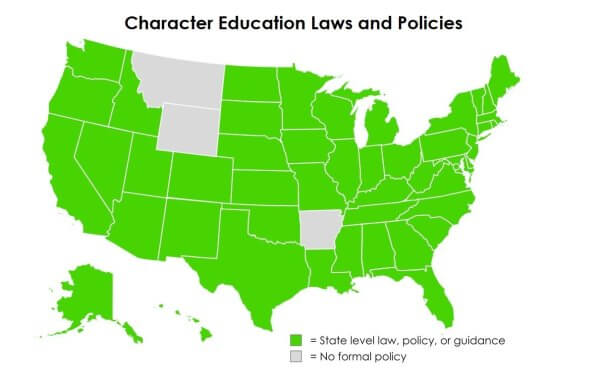Humane Education=Character Education
What is character education?
Character education is generally defined as a means of teaching students core ethical values such as citizenship, respect, justice, and responsibility for self and others. Much like a code of conduct, character education guides students to become useful and caring members of society. Many states require educators to incorporate these values into their lessons, and their inclusion provides a solid ethical foundation that benefits both children and animals.
How does character education help animals?
“Teaching a child not to step on a caterpillar is as valuable to the child as it is to the caterpillar.” —Bradley Miller
Indeed, children should be taught to revere all living beings as equally deserving of respect and unalienable rights as their peers, parents, and teachers. Character education is an idea that easily translates into animal rights by extending the values of respect and responsibility to animals. Character education is humane education.
Humane education builds empathy for animals and people. Research tells us that empathy is an important contributor to prosocial behavior (Roberts and Strayer, 1996; McDonald and Messinger, 2011). And the prevalence of antisocial behavior in youth is a problem that cannot be overstated (see “Epidemic of Youth Violence Against Animals”). Thus, an approach that builds empathy in students without sacrificing time from the curriculum is urgently needed.
Am I required to teach character education?
Many states mandate that character education be taught in schools. Check below to see if your state is among them. Even without a law requiring character education, most states encourage this type of education in schools, because it’s a logical component of the effort to counter the epidemic of bullying.
Alabama
Act 95-313
“The State Board of Education and all local boards shall develop and implement a comprehensive character education program for all grades to consist of not less than ten minutes instruction per day focusing upon the students’ development of the following character traits: Courage, patriotism, citizenship, honesty, fairness, respect for others, kindness, cooperation, self-respect, self-control, courtesy, compassion, tolerance, diligence, generosity, punctuality, cleanliness, cheerfulness, school pride, respect for the environment, patience, creativity, sportsmanship, loyalty, and perseverance. Each plan of instruction shall include the Pledge of Allegiance to the American flag” (1995 Accountability Law). (Source)
Alaska
Title 14. Education, Libraries, and Museums § 14.03.015
“It is the policy of this state that the purpose of education is to help ensure that all students will succeed in their education and work, shape worthwhile and satisfying lives for themselves, exemplify the best values of society, and be effective in improving the character and quality of the world about them.” (Source)
Arizona
Statute 15-719
“Instruction in the definition and application of at least six of the following character traits: truthfulness, responsibility, compassion, diligence, sincerity, trustworthiness, respect, attentiveness, obedience, orderliness, forgiveness, virtue, fairness, caring, citizenship and integrity.” (Source)
California
ARTICLE 5. Hate Violence Prevention Act [233–233.8]
“(a) Each teacher shall endeavor to impress upon the minds of the pupils the principles of morality, truth, justice, patriotism, and a true comprehension of the rights, duties, and dignity of American citizenship, and the meaning of equality and human dignity, including the promotion of harmonious relations, kindness toward domestic pets and the humane treatment of living creatures, to teach them to avoid idleness, profanity, and falsehood, and to instruct them in manners and morals and the principles of a free government.”
“(b) Each teacher is also encouraged to create and foster an environment that encourages pupils to realize their full potential and that is free from discriminatory attitudes, practices, events, or activities, in order to prevent acts of hate violence, as defined in subdivision (e) of Section 233.” (Source)
Colorado
§ 22-29-103
“(1) Each school district, either individually or through a board of cooperative services, is strongly encouraged to establish a character education program designed to help students cultivate honesty, respect, responsibility, courtesy, respect for and compliance with the law, integrity, respect for parents, home, and community, and the dignity and necessity of a strong work ethic, conflict resolution, and other skills, habits, and qualities of character that will promote an upright, moral, and desirable citizenry and better prepare students to become positive contributors to society. The program may include information concerning this country’s founding documents and concerning religion in American history. Such character education program should be designed to stress the importance that each teacher model and promote the guidelines of behavior established in the character education program for youth to follow at all times, in every class.” (Source)
Connecticut
Public Act No. 11-232
“Sec. 2. Section 10-222g of the general statutes is repealed and the following is substituted in lieu thereof (Effective July 1, 2011): For the purposes of section 10-222d, as amended by this act, the term ‘prevention and intervention strategy’ may include, but is not limited to, … [(6)] (4) inclusion of grade-appropriate bullying education and prevention curricula in kindergarten through high school.” (Source)
“Sec. 10-222q. Social and Emotional Learning and School Climate Advisory Collaborative. (a) There is established a social and emotional learning and school climate advisory collaborative. The collaborative shall (1) collect information concerning the school climate improvement efforts of local and regional boards of education, (2) document any needs articulated by local and regional boards of education for technical assistance and training relating to fostering positive school climates, (3) identify best practices for promoting positive school climates, (4) direct resources to support state-wide and local initiatives on issues relating to fostering and improving positive school climates and improving access to social and emotional learning in schools, (5) develop an assessment for screening students in grades three to twelve, inclusive, to determine whether such students are at risk for suicide, (6) develop a biennial state-wide school climate survey, as described in subsection (c) of section 2 of public act 19-166*, (7) develop a model positive school climate policy, as described in subsection (a) of section 2 of public act 19-166*, (8) develop a plain language explanation of the rights and remedies available under sections 10-4a and 10-4b for distribution to parents and guardians pursuant to subdivision (2) of subsection (c) of section 10-222d, and provide such explanation to each local and regional board of education not later than January 1, 2021, and (9) perform other functions concerning social and emotional learning and fostering positive school climates.” (Source)
Delaware
§ 4164 School bullying awareness and prevention
“(2) Each school district and charter school shall establish a policy which, at a minimum, includes the following components: … n. A requirement that the school bullying prevention program be implemented throughout the year, and integrated with the school’s discipline policies and § 4112 of this title.” (Source)
Delaware Administrative Code 14-609 District and School Based Intervention Services
4.2 A School Based Intervention Program shall include both short term and long term intervention strategies. Such strategies may include character education, short or long term counseling to improve behavior which impacts educational performance, and methods to identify the need to refer students for additional services either within the district or to other agencies. The Program shall also include support services to provide a smooth transition for students who are returning to their regular school from a Consortium Discipline Alternative Program or from a Department of Services to Children, Youth and their Families (DSCYF) setting. (Source)
Florida
1003.53 Dropout prevention and academic intervention.—…
Students must also be taught “kindness to animals.” (Source)
Georgia
Georgia Code Title 20–Education § 20-2-145
“The State Board of Education shall develop by the start of the 1997–1998 school year a comprehensive character education program for levels K-12. This comprehensive character education program shall be known as the ‘character curriculum‘ and shall focus on the students’ development of the following character traits: courage, patriotism, citizenship, honesty, fairness, respect for others, kindness, cooperation, self-respect, self-control, courtesy, compassion, tolerance, diligence, generosity, punctuality, cleanliness, cheerfulness, school pride, respect for the environment, respect for the creator, patience, creativity, sportsmanship, loyalty, perseverance, and virtue. Such program shall also address, by the start of the 1999–2000 school year, methods of discouraging bullying and violent acts against fellow students. Local boards shall implement such a program in all grade levels at the beginning of the 2000–2001 school year and shall provide opportunities for parental involvement in establishing expected outcomes of the character education program.” (Source)
Hawaii
Character Education Policy 101-2 (Former Policy 2109)
“The vitality and viability of our democratic way of life are dependent on all students developing into responsible and caring citizens who respect themselves, others, and the world in which they live. Character education is the process through which students are provided opportunities to learn and demonstrate democratic principles and core ethical values such as civic responsibility, compassion, honesty, integrity, and self-discipline. The Department shall identify a common core of ethical values which will be promoted throughout the public school system and serve as standards for student behavior and character development.” (Source)
Idaho
Title 33: Chapter 16 Courses of Instruction
2 (c) “The basic values of honesty, self-discipline, unselfishness, respect for authority and the central importance of work are emphasized.” (Source)
Illinois
105 ILCS 5/27-12
“Character education. Every public school teacher shall teach character education, which includes the teaching of respect, responsibility, fairness, caring, trustworthiness, and citizenship, in order to raise pupils’ honesty, kindness, justice, discipline, respect for others, and moral courage for the purpose of lessening crime and raising the standard of good character.” (Source)
School Code. (105 ILCS 5/27-13.1) (from Ch. 122, par. 27-13.1)
“Sec. 27-13.1. In every public school there shall be instruction, study and discussion of current problems and needs in the conservation of natural resources, including but not limited to air pollution, water pollution, waste reduction and recycling, the effects of excessive use of pesticides, preservation of wilderness areas, forest management, protection of wildlife and humane care of domestic animals. (Source: P.A. 86-229.)” (Source)
Indiana
IC 20-30-5-6 Good citizenship instruction
“Sec. 6. (b) As used in this section, ‘good citizenship instruction’ means integrating instruction into the current curriculum that stresses the nature and importance of the following: . . . (6) Possessing the skills (including methods of conflict resolution) necessary to live peaceably in society and not resorting to violence to settle disputes. . . . (9) Treating others the way the student would want to be treated.” (Source)
House Enrolled Act No. 1423
“(b) The department of education and the school corporation’s school safety specialist shall provide materials and guidelines to assist a safe school committee in developing a plan and policy for the school that addresses the following issues:
“(1) Unsafe conditions, crime prevention, school violence, bullying, and other issues that prevent the maintenance of a safe school. . . .
“(d) The guidelines developed under subsection (b) must include age appropriate, research based information that assists school corporations and safe school committees in:
“(1) developing and implementing bullying prevention programs; (2) establishing investigation and reporting procedures related to bullying” (Source)
Iowa
2016 Iowa Code
Title VII–EDUCATION AND CULTURAL AFFAIRS
Chapter 256–DEPARTMENT OF EDUCATION
Section 256.18–Character education policy.
“Schools should make every effort, formally and informally, to stress character qualities that will maintain a safe and orderly learning environment, and that will ultimately equip students to be model citizens. These qualities may include caring, civic virtue and citizenship, justice and fairness, respect, responsibility, trustworthiness, giving, honesty, self-discipline, respect for and obedience to the law, citizenship, courage, initiative, commitment, perseverance, kindness, compassion, service, loyalty, patience, the dignity and necessity of hard work, and any other qualities deemed appropriate by a school.” (Source)
Kansas
Article 11: Curriculum
72-3231. Character development programs.
“(a) Upon request of a school district, the state board shall assist in the development of a grade appropriate curriculum for character development programs which may be offered to students in the school district. . . .”
“(2) ‘Character qualities’ means positive character qualities which include, but is not limited to, honesty, responsibility, attentiveness, patience, kindness, respect, self-control, tolerance, cooperation, initiative, patriotism and citizenship.” (Source)
Kentucky
Kentucky Statutes 156.095—Professional development programs
(3) . . . Professional development programs shall be made available to teachers based on their needs which shall include but not be limited to the following areas:
(l) Strategies to incorporate character education throughout the curriculum
(Source)
158.005
“[C]haracter education’ means instructional strategies and curricula that: (1) Instill and promote core values and qualities of good character in students including altruism, citizenship, courtesy, honesty, human worth, justice, knowledge, respect, responsibility, and self-discipline; (2) Reflect the values of parents, teachers, and local communities; and (3) Improve the ability of students to make moral and ethical decisions in their lives.” (Source)
Louisiana
2015 Louisiana Laws
Revised Statutes
TITLE 17–Education
RS 17:282.2–Character education programs
“Character education programs; legislative findings; clearinghouse for information; permissive curriculum; dissemination of information; progress reports; rules and regulations
- The legislature finds and acknowledges that while character development is a parental responsibility, the responsibility also extends to others. The legislature further finds that character education must be augmented and reinforced by public schools in order to prepare students to be productive, self-sufficient citizens who can ably assume societal responsibilities.
- The State Board of Elementary and Secondary Education shall provide a clearinghouse for information on nonsectarian practices in character education programs within Louisiana and across the nation in order to assist public elementary and secondary schools in improving character education. Clearinghouse information shall include information about comprehensive character education programs or curricula, which focus on the development of character traits such as honesty, fairness, and respect for self and others.” (Source)
Maine
§1221. Teaching of virtue and morality
“Instructors of youth in public or private institutions shall use their best endeavors to impress on the minds of the children and youth committed to their care and instruction the principles of morality and justice and a sacred regard for truth; love of country, humanity and a universal benevolence; the great principles of humanity as illustrated by kindness to birds and animals and regard for all factors which contribute to the well-being of man; industry and frugality; chastity, moderation and temperance; and all other virtues which ornament human society; and to lead those under their care, as their ages and capacities admit, into a particular understanding of the tendency of such virtues to preserve and perfect a republican constitution, secure the blessings of liberty and to promote their future happiness.” (Source)
Maryland
§7–306
“(a) (1) In this section, “restorative approaches” means a relationshipfocused student discipline model that: (i) Is preventive and proactive; (ii) Emphasizes building strong relationships and setting clear behavioral expectations that contribute to the well–being of the school community; (iii) In response to behavior that violates the clear behavioral expectations that contribute to the well–being of the school community, focuses on accountability for any harm done by the problem behavior; and (iv) Addresses ways to repair the relationships affected by the problem behavior with the voluntary participation of an individual who was harmed. (2) “Restorative approaches” may include: (i) Conflict resolution; (ii) Mediation; (iii) Peer mediation; (iv) Circle processes; (v) Restorative conferences; (vi) Social emotional learning; (vii) Trauma–informed care; (viii) Positive behavioral intervention supports; and (ix) Rehabilitation.” (Source)
Massachusetts
Section 30: Moral education
“Section 30. The president, professors and tutors of the university at Cambridge and of the several colleges, all preceptors and teachers of academies and all other instructors of youth shall exert their best endeavors to impress on the minds of children and youth committed to their care and instruction the principles of piety and justice and a sacred regard for truth, love of their country, humanity and universal benevolence, sobriety, industry and frugality, chastity, moderation and temperance, and those other virtues which are the ornament of human society and the basis upon which a republican constitution is founded; and they shall endeavor to lead their pupils, as their ages and capacities will admit, into a clear understanding of the tendency of the above mentioned virtues to preserve and perfect a republican constitution and secure the blessings of liberty as well as to promote their future happiness, and also to point out to them the evil tendency of the opposite vices.” (Source)
Michigan
Michigan State Board of Education
Policy on Quality Character Education
“Qualities such as caring, responsibility, respect for oneself and others, fairness, trustworthiness, citizenship, and self-restraint promote a healthy, safe, and supportive learning environment that promotes the primary mission of the school, which is to educate. With effective character development programs, schools can increase academic achievement and prosocial attitudes and behaviors and decrease negative behaviors such as truancy, violence, discipline problems, and bullying.” (Source)
Minnesota
§120B.232 CHARACTER DEVELOPMENT EDUCATION.
Subdivision 1. Character development education.
“Character education is the shared responsibility of parents, teachers, and members of the community. The legislature encourages districts to integrate or offer instruction on character education including, but not limited to, character qualities such as attentiveness, truthfulness, respect for authority, diligence, gratefulness, self-discipline, patience, forgiveness, respect for others, peacemaking, and resourcefulness. Instruction should be integrated into a district’s existing programs, curriculum, or the general school environment. To the extent practicable, instruction should be integrated into positive behavioral intervention strategies, under section 122A.627. The commissioner shall provide assistance at the request of a district to develop character education curriculum and programs.” (Source)
Mississippi
Mississippi Administrative Code 7-3-15.1 Character Education
“The policy of the State Board of Education shall be to encourage each school district and each school to ensure the inclusion of character education in the entire curriculum and to include character education in the staff development programs for teachers. Source: Miss. Code Ann. § 37-1-3. (Revised 10/1997)
Missouri
Missouri Revised Statutes 170.020. Voluntary pilot program for social and emotional health in elementary schools–Staffing
(1) The department of elementary and secondary education, through its school counseling section, shall be authorized to establish a voluntary pilot program, beginning in the 2020-2021 school year, to provide for social and emotional health education in elementary schools in the state. The purpose of the pilot program shall be to determine whether and how to implement an elementary social and emotional health education program statewide. (Source)
Nebraska
“Each teacher employed to give instruction in any public, private, parochial, or denominational school in the State of Nebraska shall arrange and present his or her instruction to give special emphasis to common honesty, morality, courtesy, obedience to law, respect for the national flag, the United States Constitution, and the Constitution of Nebraska, respect for parents and the home, the dignity and necessity of honest labor, and other lessons of a steadying influence which tend to promote and develop an upright and desirable citizenry.” (Source)
Nevada
NAC 389.195.
“2.In addition to the courses prescribed by subsection 1, a course of study in academic achievement, career exploration, and personal and social development is prescribed for pupils in seventh or eighth grade.” (Source)
New Hampshire
Chapter 193-F: Pupil Safety and Violence Prevention
“IV. A school board or board of trustees of a chartered public school shall, to the greatest extent practicable, involve pupils, parents, administrators, school staff, school volunteers, community representatives, and local law enforcement agencies in the process of developing the policy. The policy shall be adopted by all public schools within the school district and, to the extent possible, the policy should be integrated with the school’s curriculum, discipline policies, behavior programs, and other violence prevention efforts.” (Source)
New Hampshire Administrative Rules Ed 306.04 Policy Development.
“(a) In accordance with Ed 303.01, the local school board shall adopt and implement written policies and procedures relative to: (1) Absenteeism and attendance; (2) Promoting school safety; (3) Discipline; (4) Records retention, including electronic files; (5) Character and citizenship; […] (i) The policy relative to character and citizenship development shall: (1) Include those elements of character and citizenship to be incorporated in courses of study or instilled, by example, in a caring educational environment, including but not limited to: a. Self-discipline, self-respect, and self-control; b. Pursuant to Part 2, Article 83 of the New Hampshire Constitution, humanity, benevolence, and truth and honesty with self and others; c. Fairness, integrity, and justice; d. Respect, courtesy, and human worth; e. Responsibility to oneself and others; f. Community service; and g. Pursuant to RSA 186:13, the rights and responsibilities of citizenship; and (2) Be developed in consultation with school staff, administration, parents, and other representatives of the community.” (Source)
New Jersey
2013 New Jersey Revised Statutes
Title 18A–EDUCATION
Section 18A:35-4.1–Course of study in principles of humanity
“Each board of education may teach, by special courses or by emphasis in appropriate places of the curriculum, in a manner adapted to the ages and capabilities of the pupils in the several grades and departments, the principles of humanity as the same apply to kindness and avoidance of cruelty to animals and birds, both wild and domesticated. L.1967, c.271.” (Source)
New Mexico
“L1.9 Social and Emotional Learning (SEL)
School possesses and promotes schoolwide behavioral norms, and explicitly teaches them along with social emotional competencies such as “selfawareness,” “self-management,” “social awareness,” “decision making,” or “relationship development skills.”” (Source)
New York
New York Consolidated Laws, Education Law–EDN § 809. Instruction in the humane treatment of animals
“The officer, board or commission authorized or required to prescribe courses of instruction shall cause instruction to be given in every elementary school under state control or supported wholly or partly by public money of the state, in the humane treatment and protection of animals and the importance of the part they play in the economy of nature as well as the necessity of controlling the proliferation of animals which are subsequently abandoned and caused to suffer extreme cruelty. Such instruction shall be for such period of time during each school year as the board of regents may prescribe and may be joined with work in literature, reading, language, nature study or ethnology. Such weekly instruction may be divided into two or more periods. A school district shall not be entitled to participate in the public school money on account of any school or the attendance at any school subject to the provisions of this section, if the instruction required hereby is not given therein.” (Source)
Section 801-A. Instruction in civility, citizenship and character education
“The regents shall ensure that the course of instruction in grades kindergarten through twelve includes a component on civility, citizenship and character education. Such component shall instruct students on the principles of honesty, tolerance, personal responsibility, respect for others, with an emphasis on discouraging acts of harassment, bullying, discrimination, observance of laws and rules, courtesy, dignity and other traits which will enhance the quality of their experiences in, and contributions to, the community. Such component shall include instruction of safe, responsible use of the internet and electronic communications. The regents shall determine how to incorporate such component in existing curricula and the commissioner shall promulgate any regulations needed to carry out such determination of the regents. For the purposes of this section, “tolerance,” “respect for others” and “dignity” shall include awareness and sensitivity to harassment, bullying, discrimination and civility in the relations of people of different races, weights, national origins, ethnic groups, religions, religious practices, mental or physical abilities, sexual orientations, genders, and sexes.” (Source)
North Carolina
Session Law 2001-363
House Bill 195
“Each local board of education shall develop and implement character education instruction with input from the local community. The instruction shall be incorporated into the standard curriculum and should address the following traits: (1) Courage.—Having the determination to do the right thing even when others don’t and the strength to follow your conscience rather than the crowd; and attempting difficult things that are worthwhile. . . . (4) Kindness.—Being considerate, courteous, helpful, and understanding of others; showing care, compassion, friendship, and generosity; and treating others as you would like to be treated.” (Source)
North Dakota
15.1-07-34.
Youth behavioral health training to teachers, administrators, and ancillary staff. 1. Every two years, each school district may provide a minimum of eight hours of professional development on youth behavioral health to elementary, middle, and high school teachers, and administrators. Each school district may encourage ancillary and support staff to participate in the professional development. Based on the annual needs assessment of the school district, these hours may be designated from the following categories: a. Trauma; b. Social and emotional learning, including resiliency; c. Suicide prevention; d. Bullying; e. Understanding of the prevalence and impact of youth behavioral health wellness on family structure, education, juvenile services, law enforcement, and health care and treatment providers; f. Knowledge of behavioral health symptoms, and risks; g. Awareness of referral sources and evidence-based strategies for appropriate interventions; h. Other evidence-based strategies to reduce risk factors for students; or i. Current or new evidence-based behavior prevention or mitigation techniques. (Source)
Ohio
3301-35-01 Purpose and definitions.
“‘Extended learning opportunities’ means a variety of initiatives that ensure students have access to a diverse array of content-rich, high-quality opportunities that expand the time they are actively engaged in learning. These opportunities provide students with structured opportunities for academic support and enrichment, extra-curricular activities, service-learning; mentoring, recreation, character education, and other developmental activities.” (Source)
Oklahoma
Section 732. Control and Discipline of Child.
“A. Each district board of education shall adopt a policy for the discipline of all children attending public school in that district, and for the investigation of reported incidents of bullying. The policy shall provide options for the methods of discipline of the students and shall define standards of conduct to which students are expected to conform. The policy shall: . . .
“10. Provide for an educational program as designed and developed by the State Department of Education and in consultation with the Office of Juvenile Affairs for students and parents in preventing, identifying, responding to and reporting incidents of bullying.” (Source)
“Oklahoma Statutes 70-1210.229-6. Program of character education.
- The board of education of every school district in this state may develop and implement a comprehensive program for character education in any single grade or combination of grades, prekindergarten through twelfth. The character education program shall focus on development of character traits in students. The program of character education may include, but shall not be limited to, the voluntary reciting of the Pledge of Allegiance to the flag of the United States of America.
- The State Department of Education shall develop and make available to all school districts through an Internet website, the following:
-
- Technical assistance upon request of a school district;
-
- A list of approved research-based character education programs, curricula, and materials which may be used by school districts;
-
- A character education honor roll that will recognize school districts that have successfully implemented a comprehensive school-district-wide program of character education and will highlight the positive impacts the program has had on each school or school district; and
-
- A character education reading list of books that may include, but is not limited to, books that illustrate models of good character and books that relate to the development of good character traits that may be used by schools in a character education program.” (Source)
Oregon
2017 ORS 336.067¹
Topics given special emphasis in instruction
“In public schools special emphasis shall be given to instruction in:
(a) Honesty, morality, courtesy, obedience to law, respect for the national flag, the Constitution of the United States and the Constitution of the State of Oregon, respect for parents and the home, the dignity and necessity of honest labor and other lessons that tend to promote and develop an upright and desirable citizenry. . .
(d) Humane treatment of animals.” (Source)
Pennsylvania
Section 1502-E. Character education program.
“The program may include and teach the following basic civil values and character traits: … (2) Respect, including regard for others, tolerance and courtesy. . . . (5) Caring, including kindness, empathy, compassion, consideration, generosity and charity.” (Source)
§ 15-1514. Humane education
“Instruction in humane education shall be given to all pupils up to and including the fourth grade, and need not exceed half an hour each week during the whole school term. No cruel experiment on any living creature shall be permitted in any public school of this Commonwealth.” (Source)
Rhode Island
House Resolution
Endorsing the Implementation of Character Development Education in Rhode Island Public Schools
“The Rhode Island General Assembly recognizes that, in the face of the deteriorating social fabric, parents, schools and other community institutions, working together as partners, must increasingly contribute to the development of good character in the young through both teaching and modeling.” (Source)
Non-Codified Policy
“Social and Emotional Learning and development of SEL standards was included as part of the 2015-20 RIDE Strategic Plan in the area of Globally Competent Graduates. One Key Outcome of that Strategic Plan is that “Rhode Island graduates possess the social and emotional skills necessary to persevere through challenging circumstances, to work in partnership with others, and to develop a growth mindset”.” (Source)
South Carolina
SECTION 59-17-135. (Amended) Character education.
“(B) Each local school board of trustees of the State must develop a policy addressing character education. Any character education program implemented by a district as a result of an adopted policy must, to the extent possible, incorporate character traits including, but not limited to, the following: respect for authority and respect for others, honesty, self-control, cleanliness, courtesy, good manners, cooperation, citizenship, patriotism, courage, fairness, kindness, self-respect, compassion, diligence, good work ethics, sound educational habits, generosity, punctuality, cheerfulness, patience, sportsmanship, loyalty, and virtue.” (Source)
South Dakota
13-33-6.1. Character development instruction.
“Unless the governing body elects, by resolution, effective for not less than one or more than four school terms, to do otherwise, character development instruction shall be given in all public and nonpublic elementary and secondary schools in the state to impress upon the minds of the students the importance of citizenship, patriotism, honesty, self discipline, self respect, sexual abstinence, respect for the contributions of minority and ethnic groups to the heritage of South Dakota, regard for the elderly, and respect for authority.” (Source)
Tennessee
T.C.A. 49-6-1007(a). Character Education –
(a) The course of instruction in all public schools shall include character education to help each student develop positive values and improve student conduct as students learn to act in harmony with their positive values and learn to become good citizens in their school, community, and society. (Source) *Select Legislation and Guidance
Texas
Sec. 29.906. CHARACTER TRAITS INSTRUCTION
(a) The State Board of Education shall integrate positive character traits into the essential knowledge and skills adopted for kindergarten through grade 12, as appropriate.
(b) The State Board of Education must include the following positive character traits:
(1) courage;
(2) trustworthiness, including honesty, reliability, punctuality, and loyalty;
(3) integrity;
(4) respect and courtesy;
(5) responsibility, including accountability, diligence, perseverance, and self-control;
(6) fairness, including justice and freedom from prejudice;
(7) caring, including kindness, empathy, compassion, consideration, patience, generosity, and charity;
(8) good citizenship, including patriotism, concern for the common good and the community, and respect for authority and the law;
(9) school pride; and
(10) gratitude.
(c) Each school district and open-enrollment charter school must adopt a character education program that includes the positive character traits listed in Subsection(b). (Source)
Utah
Utah Code Part 6: Bullying and Hazing
“(2) To the extent that state or federal funding is available for this purpose, school boards are encouraged to implement programs or initiatives, in addition to the training described in Subsection (1), to provide for training and education regarding, and the prevention of, bullying, hazing, abusive conduct, and retaliation.” (Source)
R277-475-3. Patriotic, Civic and Character Education.
“(1) An LEA shall provide instruction for patriotic, civic and character education in the social studies curricula of kindergarten through grade twelve.(2) An LEA shall ensure an educator has responsibility for patriotic, civic and character education taught in an integrated school curriculum and in the regular course of school work. (Source)
R277-475-7. Civic Engagement.
“B. Civic and character education shall be achieved through an integrated school curriculum and in the regular course of school work.” (Source)
Vermont
16 V.S.A. § 2902
“2902. Tiered system of supports and educational support team
(5) provide all students with a continuum of evidence-based positive behavioral practices that promote social and emotional learning, including trauma-sensitive programming, that are both school-wide and focused on specific students or groups of students;” (Source)
Virginia
§ 22.1-208.01. Character education required.
“Each school board shall establish, within its existing programs or as a separate program, a character education program in its schools, which may occur during the regular school year, during the summer in a youth development academy offered by the school division, or both. The Department of Education shall develop curricular guidelines for school divisions to use in establishing a character education program through a summer youth development academy. The purpose of the character education program shall be to instill in students civic virtues and personal character traits so as to improve the learning environment, promote student achievement, reduce disciplinary problems, and develop civic-minded students of high character. The components of each program shall be developed in cooperation with the students, their parents, and the community at large. The basic character traits taught may include (i) trustworthiness, including honesty, integrity, reliability, and loyalty; (ii) respect, including the precepts of the Golden Rule, tolerance, and courtesy; (iii) responsibility, including hard work, economic self-reliance, accountability, diligence, perseverance, and self-control; (iv) fairness, including justice, consequences of bad behavior, principles of nondiscrimination, and freedom from prejudice; (v) caring, including kindness, empathy, compassion, consideration, generosity, and charity; and (vi) citizenship, including patriotism, the Pledge of Allegiance, respect for the American flag, concern for the common good, respect for authority and the law, and community-mindedness.” (Source)
Washington
RCW 28A.150.211 Values and traits recognized.
“The legislature also recognizes that certain basic values and character traits are essential to individual liberty, fulfillment, and happiness. However, these values and traits are not intended to be assessed or be standards for graduation. The legislature intends that local communities have the responsibility for determining how these values and character traits are learned as determined by consensus at the local level. These values and traits include the importance of:
(1) Honesty, integrity, and trust;
(2) Respect for self and others;
(3) Responsibility for personal actions and commitments;
(4) Self-discipline and moderation;
(5) Diligence and a positive work ethic;
(6) Respect for law and authority;
(7) Healthy and positive behavior; and
(8) Family as the basis of society.”
(Source)
RCW 28A.230.020 Common school curriculum.
“All teachers shall stress the importance of the cultivation of manners, the fundamental principles of honesty, honor, industry and economy, the minimum requisites for good health including the beneficial effect of physical exercise and methods to prevent exposure to and transmission of sexually transmitted diseases, and the worth of kindness to all living creatures and the land.” (Source)
West Virginia
West Virginia Code 18-2-13
“(a) The state board shall establish a comprehensive approach to integrate character education into all aspects of school culture, school functions and existing curriculum.
(b) The state board shall require all public schools that operate from preschool to grade twelve to develop and integrate components of character development into their existing curriculum. The schools may incorporate such programs as “life skills”, “responsible students”, or any other program encompassing any of the following components:” (Source)
Wisconsin
Non-codified Policy
“The Wisconsin Character Education Partnership (WCEP) promotes the intentional, proactive efforts of educators to instill in all Wisconsin’s students, core universal ethical values such as integrity, honesty, fairness, responsibility, and respect for themselves and for others through character education.” (Source)
How can I teach character education on top of the existing curricular demands?
The good news is that you can foster prosocial and empathic behavior in children while simultaneously meeting rigorous academic standards. Children have a natural affinity for animals; therefore, any curriculum that incorporates animal issues will generate high interest from students. Add a component about how to protect animals in real-world situations and watch students become even more motivated to learn. When your students are motivated, the conditions are ideal for them to practice reading and writing skills that involve the animal-rights issue being discussed.
Does TeachKind offer any resources to help me teach character education?
Since a discussion about animal rights issues and fostering empathy for animals should be part of any program to build character in youth, TeachKind has got you covered.
- Our FREE Share the World kit is perfect for teaching elementary school students about the Golden Rule and the importance of compassion and empathy—as well as reading and writing skills.
- Our FREE Humane Lesson Webinar can help you merge academic skills with compassion.
- Our FREE Lessons and Activities give you the resources that you need to incorporate compassion for animals into your curriculum.
- Order FREE TeachKind materials for your classroom.
- Contact TeachKind for suggestions or advice. We’re also available for presentations to teachers in the Virginia Beach, Virginia, area.
Humane education has the potential to motivate students struggling with a new, demanding Common Core curriculum and to foster compassion for animals that will extend to humans as well.
References
McDonald, N. and Messinger, D. (2011). “The Development of Empathy: How, When, and Why.” In A. Acerbi, J. A. Lombo, and J.J.Sanguineti (Eds.), Free Will, Emotions, and Moral Actions: Philosophy and Neuroscience in Dialogue. IF-Press.
Roberts, W. and Strayer, J. (1996). “Empathy, Emotional Expressiveness, and Prosocial Behavior.” Child Development, 67, 449‒470








